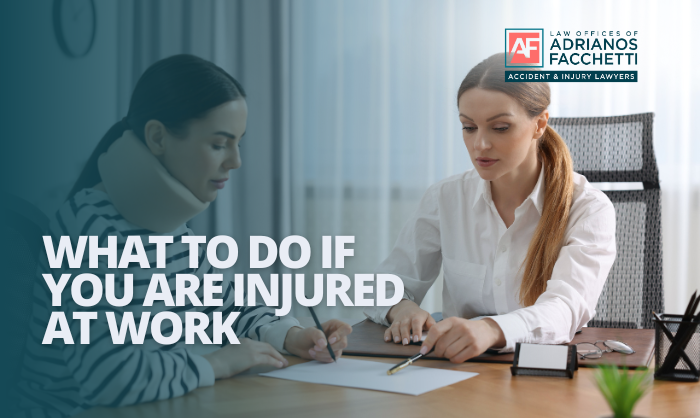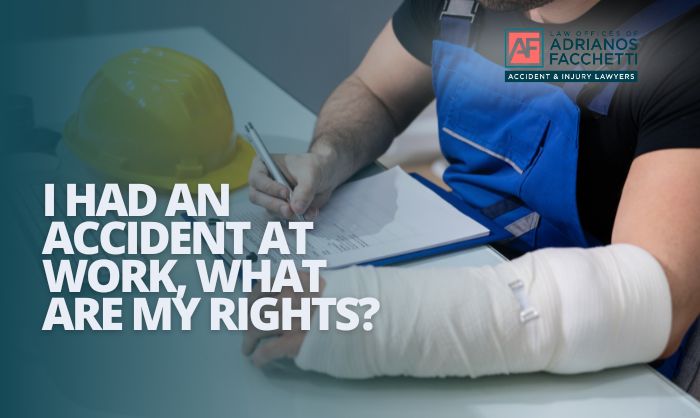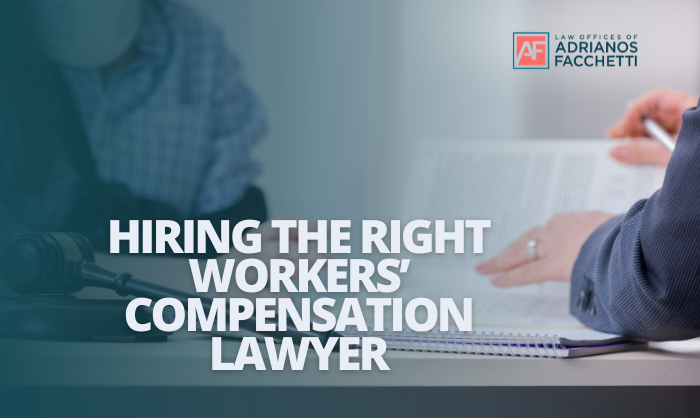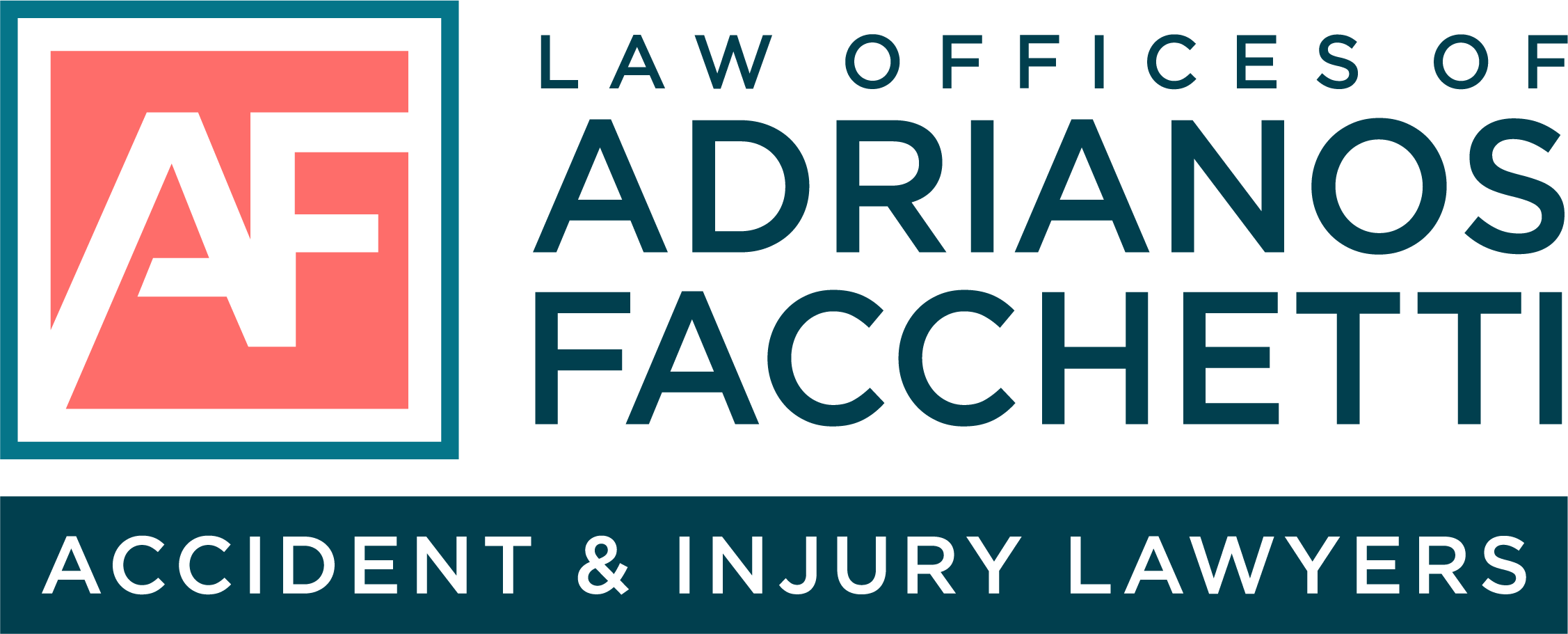You didn’t expect to get hurt at work, but here you are, dealing with pain, confusion, and a dozen questions about what to do next. Can you see your own doctor? Will you get paid? And what happens if your employer pushes back?

If you’ve been injured at work, don’t wait to figure it out later. Whether it’s a back strain, a fall, or something more serious, you need to take the right steps now to protect your health and your rights. A trusted Los Angeles workers compensation lawyer at the Law Offices of Adrianos Facchetti, Accident & Injury Lawyers, can help, but first, here’s exactly what to do.
Common Causes of Workplace Injuries
Work-related injuries can happen in all kinds of jobs whether you work in an office, a warehouse, or out in the field. Some are sudden, while others develop slowly over time. Either way, understanding the most common causes can help you stay alert and take action sooner if something goes wrong.
These are the types of workplace hazards we see most often in Burbank and throughout California:
- Slips and falls – Wet floors, uneven surfaces, or poorly marked hazards can lead to serious injuries.
- Repetitive motion injuries – Tasks that require the same movement every day can strain muscles and joints over time.
- Falling objects – Items falling from shelves or equipment can cause head, neck, or back injuries.
- Machine-related accidents – Malfunctioning or unguarded machines can catch clothing, pinch fingers, or cause more serious harm.
- Chemical exposure – In some workplaces, employees face risks from cleaning agents, solvents, or industrial chemicals.
No matter how the injury happens, it’s still a work accident and it should be taken seriously. If any of these apply to your situation, you may be entitled to workers’ compensation.
Step 1: Get Medical Attention Immediately
The first thing you should do after a work-related injury is get medical care, even if the injury seems small. Your health comes first, and a delay in treatment could make things worse or complicate your claim later.
If it’s an emergency, call 911 or go straight to the ER. For non-emergency situations, your employer may have a list of approved medical providers under their workers’ compensation insurance. It’s okay to ask which medical provider you should see.
Be clear with your doctor that your injury happened at work. Tell them what you were doing, how it happened, and what parts of your body are affected. That information becomes part of your injury report and is important when filing for benefits.
Getting the right medical treatment right away not only helps your recovery but also builds a stronger case for your workers’ comp claim.
Step 2: Report the Injury to Your Employer
After getting medical care, the next step is reporting the injury to your employer. This isn’t just a formality, it’s a critical part of starting your workers’ compensation claim. Without a proper injury report, benefits could be delayed or denied.
Tell your supervisor as soon as you can, ideally in writing. Even if you already spoke to them verbally, follow up with a written notice or email to create a clear record.
Don’t wait. California law requires that work injuries be reported within 30 days. Waiting too long may affect your eligibility for workers’ compensation benefits.
When you make the report, be sure to include what happened, when and where it happened, and which body parts were hurt. Your employer should give you a claim form often called an Employee’s Claim for Benefits or company accident report, within one working day.
Step 3: File a Workers’ Compensation Claim
Once you’ve reported the injury, the next step is to officially file a workers’ compensation claim. This is how your benefits get started without a claim on file, the process can’t move forward. Your employer is required to give you the Employee's Claim for Benefits form, often called a DWC-1, within one working day of your report.
Fill out your section of the form carefully. Be sure to list all injured body parts, even if something feels minor at the time. Injuries can evolve, and leaving something out early on can make it harder to get coverage later.
After completing the form, give it back to your employer and keep a copy for your records. This becomes your official claim file, and it’s important to have documentation if questions or delays come up with the insurance company.
Filing a claim protects your right to receive medical treatment, lost wage benefits, and more under workers’ compensation insurance. The sooner you complete this step, the better.
Step 4: Follow Medical Advice and Keep Records
Getting medical care is just the beginning, staying on track with your treatment plan is what helps you recover and supports your claim. That means following through on doctor visits, physical therapy, or any recommended medical procedures.
Keep detailed notes on how you're feeling day to day. Tracking symptoms and limitations helps document your progress and may support any future decisions about disability compensation.
Hold on to everything: test results, prescriptions, medical bills, and other medical records tied to your injury. These show what care you received and prove that expenses are tied directly to the work incident.
If something isn’t helping or you need a referral to a new healthcare provider, say so, but don’t skip appointments or stop treatment without speaking to your doctor first. Consistent care strengthens your case.
Step 5: Know Your Legal Rights and Deadlines
Every step in the workers’ compensation law process has deadlines. In California, you generally have 30 days to report the injury and one year to file your formal claim. Missing these can mean losing your right to benefits.
You also have the right to be protected from retaliation. If your employer starts treating you differently after your claim like cutting your hours, assigning harder tasks, or letting you go that could be a violation of your rights under state and federal laws.
Sometimes, a work injury might also qualify for a personal injury lawsuit for example, if you were hurt by a third party or defective equipment. In those cases, you may have the option to pursue compensation outside of the workers’ compensation system, including through civil court.
Knowing your options gives you control over your recovery and your future. Understanding how state laws protect you is one of the best ways to avoid being taken advantage of after a work accident.
Step 6: When to Hire a Workers’ Compensation Attorney
Sometimes the workers’ compensation process doesn’t go smoothly. You might do everything right and still run into problems like a denied claim, delayed medical treatment, or unclear communication from the insurance company.
This is when speaking with a work injury lawyer can help. If you're being pressured to return to work before you’re ready, or your benefits were suddenly reduced, legal guidance can make sure your rights under workers’ compensation law are protected.
An experienced attorney can also help you navigate the claim adjudicator process, handle communication with the insurance company, and represent you if your case moves to civil court or requires a formal hearing.
You don’t have to wait until things get worse. Getting legal help early can prevent small problems from becoming bigger ones and protect your chance of full recovery.
What If Workers' Comp Isn’t Available?
Not every injured worker is covered under standard workers’ compensation. If you're an independent contractor, work for a self-insured employer, or your employer failed to carry coverage, your options may look different.
In some cases, you may need to pursue personal injury claims against a third party like a contractor, property owner, or equipment manufacturer if they contributed to your injury.
You may also be able to file a claim through the employer’s liability insurance policy or look into state-managed funds for uninsured workers.
These situations can be more complex, but they aren’t impossible. An attorney familiar with these cases can help you understand what to expect when workers' comp isn't an option and what steps to take next.
How Long Can You Receive Workers’ Compensation?
The length of time you can receive workers’ compensation benefits depends on the nature of your injury and the rules in your state. Some benefits cover just a few weeks; others extend into temporary or permanent disability benefits.
Generally, workers’ comp pays medical bills for as long as treatment is needed. Wage loss benefits are time-limited but may be extended if your doctor says you’re unable to return to work.
Every compensation claim is reviewed based on medical updates, job restrictions, and progress over time. The insurance carrier or the Department of Industrial Accidents may reassess eligibility during recovery.
Understanding these timeframes helps you plan and gives you more control over your financial and medical future while you focus on healing.
Final Tips: Stay Organized and Take Action Early
When you're dealing with a compensation claim, the small details matter. Staying organized from the start can save time, reduce stress, and help you avoid problems with your insurance company or employer down the line.
Start by creating a dedicated place, whether it's a physical folder or a digital file to store everything related to your injury claim. That includes medical records, letters from your doctor, notes from appointments, and paperwork from your employer.
It also helps to log every conversation with your employer, insurer, or healthcare provider. Dates, names, and a short summary of what was said can be important if your claim is delayed or disputed.
Taking early steps like these puts you in a better position to protect your rights and prove your case if needed.
FAQs: What Injured Workers Also Ask
What happens if I don’t report right away?
If you delay reporting a work-related injury, you risk losing eligibility for benefits. In California, you generally have 30 days to report it to your employer.
Can I get fired for filing a claim?
It's illegal for an employer to fire or retaliate against injured workers for filing a claim. If it happens, you may have additional legal options.
Can I go to my own doctor?
That depends. If your employer has a medical provider network, you may need to see someone in that network first. You can usually switch after a certain time.
What benefits am I entitled to?
You may be eligible for medical treatment, lost wages, and sometimes compensation for pain and suffering. The exact benefits depend on your injury and state law.
What if I’m injured off-site while working?
If the injury happened while performing your job, even away from your main workplace, it may still count as an on-the-job injury and be covered by workers’ comp.
Free Consultation With a Work Injury Lawyer
Not sure what to do next? Speaking with a work injury lawyer can help you understand your options before filing a claim and help avoid mistakes that could affect your case.
You don’t need to figure it out alone. A hurt at work lawyer can walk you through your rights and how the process works, whether your claim is just starting or already hit a roadblock.
There’s no risk to reach out. At the Law Offices of Adrianos Facchetti, Accident & Injury Lawyers, your first consultation is free and you don’t pay unless we win your case.













